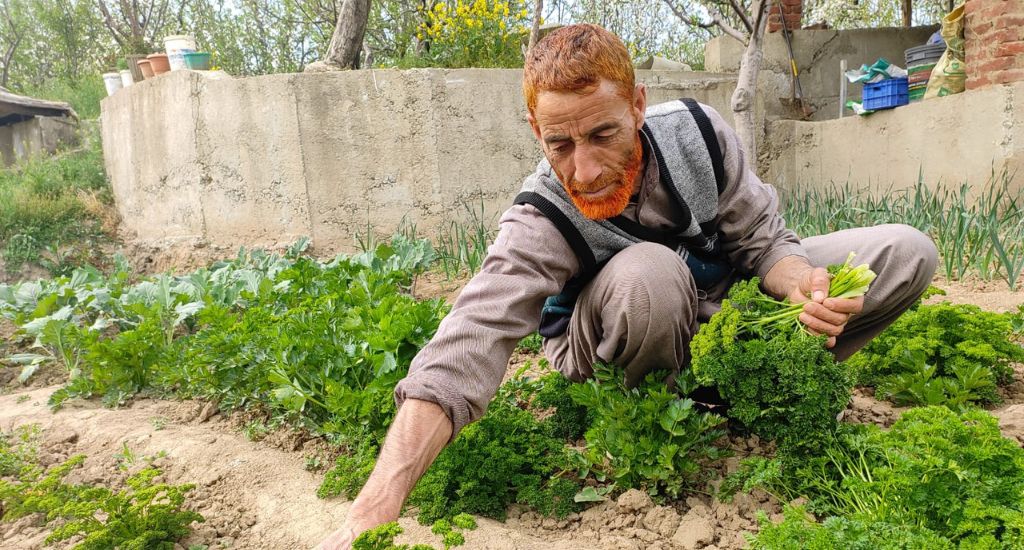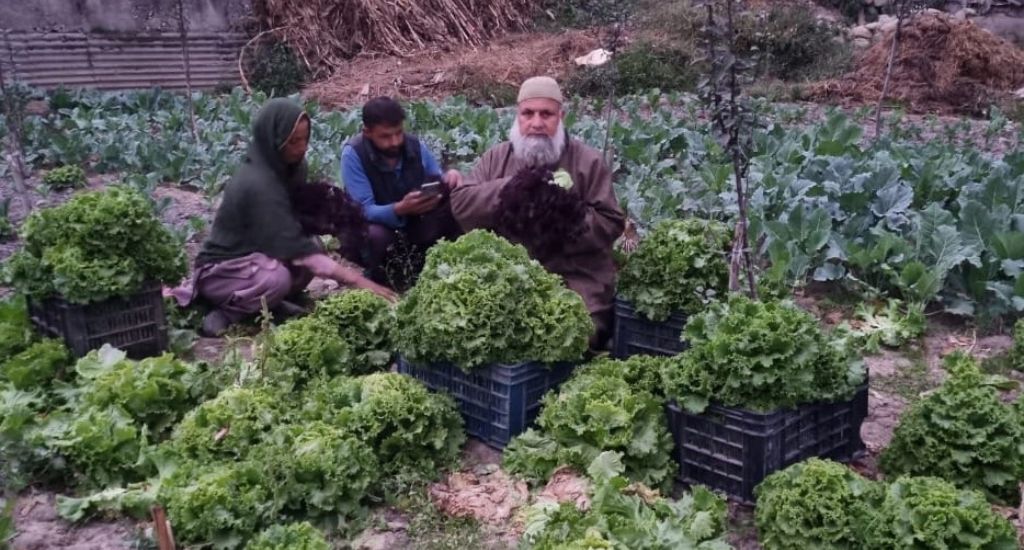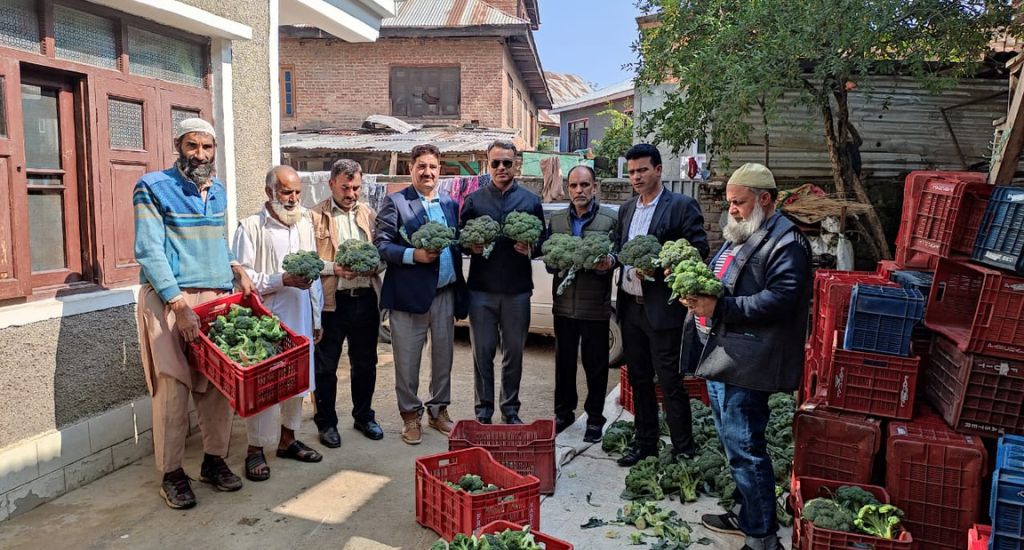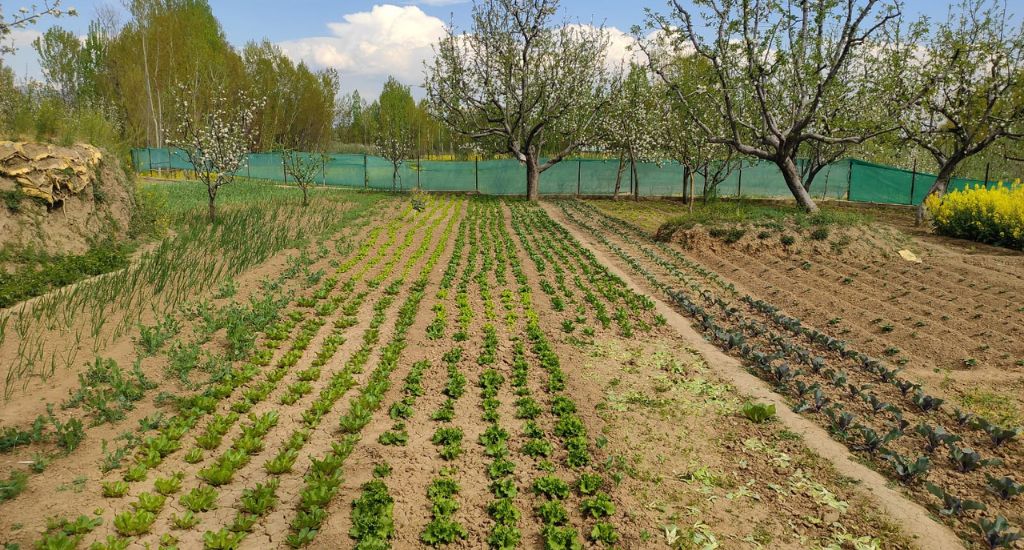
Kashmir’s farmers switch from growing apples to exotic greens
Fruit cultivation is a mainstay of Kashmir’s economy, but many farmers are clearing orchards and shifting to integrated farming to grow exotic vegetables.

Fruit cultivation is a mainstay of Kashmir’s economy, but many farmers are clearing orchards and shifting to integrated farming to grow exotic vegetables.
A Kashmiri proverb talks about all days being not equal: “Preth doh chu na hui asaan”. Farmer Farooq Ahmad Ganaie of Tahab village in Pulwama district of south Kashmir knows it all too well.
The 50-year-old vividly remembers how he chucked gunny sacks filled with home-grown exotic greens in the fast-flowing Jhelum river out of desperation because no one would buy them in Srinagar, about 35km away from his home, let alone folks in his village.
That was in 2020. The sacks he hauled to Srinagar contained his first batch of red cabbage, lollo and iceberg lettuces, parsley, celery, bok choy, and broccoli that he had grown on a parcel cleared out of his apple orchard.

“I didn’t have a choice. People wouldn’t take away the vegetables even for free. Rural folks didn’t even know the names of these leafy vegetables. Forget about them cooking these,” Ganaie said with a heavy heart, stroking his reddish beard coloured with henna.
Also Read | Immerse yourself in a sea of tulips this summer
Cut to 2023. Ganaie’s one-acre farm produces more than 31 varieties of exotic vegetables in different shades of colour and traders from Srinagar come to him to buy them.
“I had to dump my harvest twice before a vegetable dealer from Srinagar came with regular orders. I have never looked back,” he said.
The turnaround can be attributed to his never-give-up attitude in the face of initial failures and a growing demand for exotic greens in Srinagar’s high-end restaurants and hotels that are seeing an uptick in bookings because of a surge in tourist numbers over the past couple of years.
I used to import such vegetables from Punjab and Haryana. But we are getting these from local farmers from Pulwama and other areas for the past couple of years. It has helped keep the price in check and ensure regular supply.
As the demand grew, Ganaie felled more apple trees in his orchard. “It has been challenging, but trading apples for vegetables has paid off,” said the man whose success has inspired many to try their hand at avant-garde vegetables.
Fruit cultivation is the backbone of Kashmir’s economy, and gives work to about 3 million people, according to government data. In southern Kashmir, where Ganaie lives, dense apple orchards stretch through hundreds of villages.

The apple orchards, livelihood for nearly half the region’s people, suffered during the long political and pandemic lockdown in 2019-2020 with fruit rotting on the trees at a time when they should be bustling with harvesters. With the farm supply chain in disarray, farmers are unable to get goods to market.
Also Read | Kashmiri harissa: From posh grub to comfort food
The crippling of this economic backbone drove people like Ganaie to look for alternatives—and he found exotic vegetables that fetch more money than seasonals a doable, lucrative option.
Taking a leaf out of Ganaie’s accomplishment, more than 12 fruit growers in Tahab and adjacent villages switched to organic vegetable farms over the past year. Integrated farming using homemade manure and compost has now become the buzzword in the orchards.
According to Nazir Ahmad Bhat, agricultural extension officer of Tahab, growing fruits and vegetables on the same farm has opened a window to a regular cash flow as farmers can produce three to four crops of greens a year.

Irshad Ahmad Dar, 46, of Patlibagh village agrees. “Apart from good returns, these vegetables provide me a regular income throughout the year,” said the farmer who grows salad greens that sell for lakhs of rupees.
With demand for such premium and organic farm produce jumping in Kashmir, farmers in other districts, such as Ganderbal and Budgam in central Kashmir, and Bandipora and Baramulla in the north have been approaching Ganaie for guidance.
“They call me or visit my farm. But I tell them to consult local agricultural offices for better help. Many people have started growing the same varieties of vegetables in their fields and backyards,” Ganaie said.
Also Read | Shrinking Wular Lake shrivels water chestnut harvests in Kashmir
Agriculture director Chowdhary Mohammad Iqbal and his field officers are aware of the growing trend.
“Many people visit our office for advice. More than 50 hectares of land across the Valley are under cultivation of exotic vegetables,” he said.
His department encourages farmers to follow integrated farming practices as it brings “overall economic prosperity to the farming community”.

Kashmir’s pristine mountainous landscapes, fast-flowing rivers, Mughal-era gardens, ski resorts, Alpine meadows, hand-carved lake houseboats, and orchards have long made it a tourist attraction. But tourism, a mainstay of its economy, took a serious hit during the coronavirus pandemic.
Things are not the same anymore. Hordes of vacationers flocked to Jammu and Kashmir’s holiday hotspots after travel restrictions were lifted – so much so that it received 16.2 million tourists in 2022.
Farmers like Ganaie are cashing in on this heavy influx of tourists.
“I used to import such vegetables from Punjab and Haryana. But we are getting these from local farmers from Pulwama and other areas for the past couple of years. It has helped keep the price in check and ensure regular supply,” said Aijaz Ahmad, a vegetable dealer in Srinagar.
Also Read | The ‘faere’ tale of Kashmir’s smoked fish dish
The lead image at the top shows Kashmir farms growing exotic vegetables (Photo by Nasir Yousufi)
Nasir Yousufi is a journalist based at Srinagar.